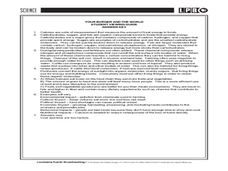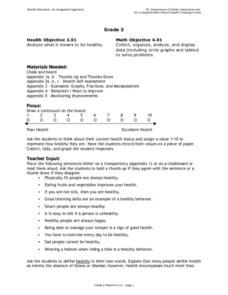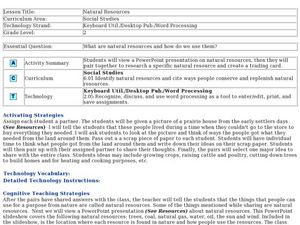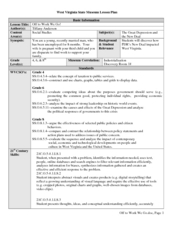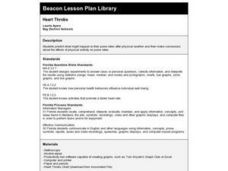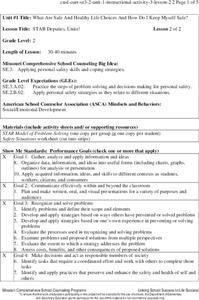Project SMART
Dinosaur Trek
Second graders investigate dinosaurs. They explore various websites, submit questions to a paleontologist online, construct cut and paste model dinosaur skeletons, develop a graph to compare dinosaurs, and label pictures from online...
Curated OER
Fast Food: You Can Choose!
Learners research the nutritional value of fast food. They assess which fast foods are best and worst to eat. They organize their data into tables and graphs and explain their findings to other students.
Curated OER
Analyzing Health
Third graders analyze their health. In this analysis lesson plan, 3rd graders rate their health on a 1-10 scale. They then tally the scores from the class and create a data chart. Then they answer true and false questions based on...
Curated OER
Natural Resources
Fifth graders begin the lesson by identifying the different types of natural resources. As a class, they discuss how environments are destructed and how the loss of one natural resource can affect the economy. Using a map, they label the...
Curated OER
Computers: Copyright Law
Students visit various Websites to find information about copyright laws. Their research includes information about legal and ethical behaviors regarding Internet use. In addition, students complete online student activity sheets.
Curated OER
Solar Energy - Dehydration
Sixth graders explore process of drying food using solar energy. They cook and/or dry food such as pumpkins, watermelon, corn, and deer meat, explain how solar energy changes foods, and compare and contrast solar energy with other forms...
Curated OER
Peer Pressure
Students talk about how their peers can influence their behavior. In this peer pressure lesson, students complete a KWL chart on peer pressure, read a handout on peer pressure and break into groups to discuss the information. Students...
Missouri Department of Elementary
Respect for Self and Others—Giving and Getting the Big R
Tween find out what it means to give and get respect. After reviewing the Recipe for Relationships studied in a previous instructional activity, groups create a dramatization of two-minute scenario in which an individual behaves...
Curated OER
Awesome Animals
Students collect data from classmates about their favorite animal. They use the ClarisWorks graphing program to enter data, graph results, and interpret data.
Curated OER
Off to Work We Go!
Young scholars create a book about The Great Depression in West Virginia. In this West Virginia history lesson, students visit the West Virginia State Museum, answer questions about West Virginia history, and create a book entitled...
Curated OER
HEART THROBS
Students predict what might happen to their pulse rates after physical exertion and then make conclusions about the effects of physical activity on pulse rates.
College Board
Civic Knowledge and Action in AP U.S. Government and Politics
Vote, it's your civic duty! The high school instructional activity focuses on voter turnout and civic participation with a series of activities. Young scholars analyze data to discover voter turnout trends, complete worksheets, and...
Missouri Department of Elementary
If It’s to Be, It’s Up to Me
Here's a clever switch on the tale of Pandora's Box. Rather than lifting the lid and having problems escape, class members write a problem on a strip of paper and place it in Pandora's Problem Box. A student then pulls a problem...
NOAA
Tides
Low tides, high tides, spring tides, neap tides, diurnal tides, semidiurnal tides, mixed tides ... just how many types of tides are there? The 10th installment of a 23-part NOAA Enrichment in Marine sciences and Oceanography (NEMO)...
West Virginia Department of Education
Editorials: The Guiding Voice of Authority?
How much can opinion influence a news story? A standalone resource discusses the importance of John Brown's Raid through the lens of journalism. Learners analyze two different texts, one from the perspective of the North and the other of...
West Virginia Department of Education
Harpers Ferry Letters
Scholars write letters as if they were someone who heard the story of John Brown's raid. The resource, a standalone, covers information from primary sources that is important to West Virginian history: the Harpers Ferry Letters.
West Virginia Department of Education
History Scene Investigators - John Brown's Raid
An informative resource covers the event of John Brown's Raid, an event that became an important part of West Virginia history. It serves as a standalone and covers the event and John Brown's life in depth using group work, online...
Missouri Department of Elementary
Are You Balanced?
Balance scales create a strong visual of how an individual prioritizes one's self alongside their commitments to the community, school, and home. Scholars complete a graphic organizer then discuss their findings with their peers. A...
Missouri Department of Elementary
Ingredients of a Relationship Recipe
An eye-catching hook makes a smart analogy between ingredients for a food recipe and ingredients for quality relationships. Scholars discuss and list qualities they feel contribute to positive interactions. Pupils create a recipe card...
Missouri Department of Elementary
STAR Deputies
Scholars become STAR deputies in a lesson that encourages them to be problem-solvers. Small groups gather to complete a worksheet by answering questions. A discussion presents a scenario in which a problem occurs on the playground. Small...
Missouri Department of Elementary
STAR Deputies, Unite!
STAR deputies unite! Scholars gather in small groups to solve problems using the STAR method. Pupils read a card that describes a situation that requires problem-solving. They role-play the scenario in front of their peers.
Missouri Department of Elementary
To Give In or Not to Give In—That Is the Question!
No! A very simple word that can be very hard to say. Seventh graders have an opportunity to practice this difficult skill as they engage in a series of role-playing scenarios. As an exit ticket, 7th graders write a reflection on the...
Missouri Department of Elementary
Opportunity Knocks, But It Costs, Too!
Sixth graders practice six steps to effective problem solving. Working with the school counselor, class members are presented with a scenario that requires them to make a decision. Individuals then write a reflection in which they...
Missouri Department of Elementary
Life … Bring It On!
To conclude the study of coping skills, class members create a collage that identifies and celebrates their strengths that support their ability to make good decisions.



